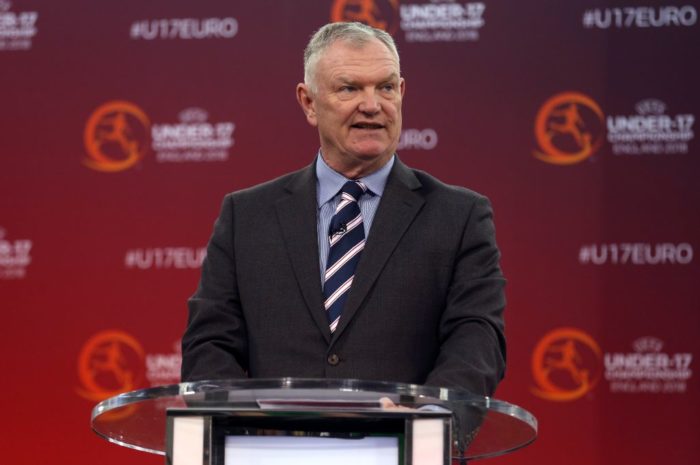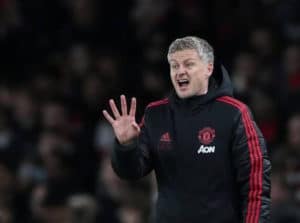A breakaway league was ‘mooted as a threat’ in Project Big Picture discussions, Football Association chairman Greg Clarke has said.
Clarke revealed in a letter to the FA Council he had been part of initial discussions until late spring, when he walked away.
At that point, he claims ‘the principal aim of these discussions became the concentration of power and wealth in the hands of a few clubs with a breakaway league mooted as a threat’.
He added: ‘I, of course, discontinued my involvement and counselled a more consensus-based approach involving all Premier League clubs and its chair and CEO. Our game needs to continually seek to improve but benefits need to be shared.’
Project Big Picture discussions have been led by Liverpool and Manchester United and became public knowledge this past Sunday.
The plans also have the backing of EFL chairman Rick Parry, with the PBP proposals including an immediate £250-million bailout for clubs in his competition starved of match-day income by the coronavirus pandemic and a promised 25% share of future Premier League broadcast revenue.
However, the plans have been criticised over proposals which appear to concentrate power in the hands of the Premier League big six, including over broadcast arrangements, club ownership and composition of the league’s board.
Clarke warned that the FA had ‘substantial controls’ it could bring to bear if it felt any proposal was put forward that ran counter to the interests of the game, and that any breakaway competition would not be sanctioned by the FA.
‘We, the FA board and council, have to ensure that any changes would be to the long-term benefit of the whole of football and we have substantial controls to help ensure that the best interests of the game are served by any new proposals,’ he said.
‘In addition to the special share in the Premier League, which prevents certain changes being made to the constitution without the FA’s consent, it is also the FA’s responsibility to sanction competitions in England – including any proposed new competition – as well as being responsible for licensing clubs, through Uefa, to play in Europe. Additionally, Uefa looks to us to nominate the league, and therefore the clubs, that will play in their competitions.
‘Let’s continue to work together to determine what is best for English football, with full dialogue between all key stakeholders.
‘However, there is more to our game than economics. Change must benefit clubs, fans and players, not just selective balance sheets. In these difficult times unity, transparency and common purpose must override the interests of the few.’
The FA Council is meeting on Thursday.
Ahead of that, Parry has addressed EFL clubs on the PBP proposals on Tuesday, while Premier League clubs are holding a shareholders’ meeting on Wednesday.
A source close to the PBP plans accepts the proposals are radical, but insists radical solutions are required to protect the English football pyramid.
The PA news agency has been told that they are intended to serve as a starter for a discussion around the sustainability of the pyramid and the fixture calendar.
While a number of EFL clubs have cautiously welcomed the plans as a useful starting point for a discussion on the wider governance of the game, they have been described as ‘a sugar-coated cyanide pill’ by the Football Supporters’ Association.
An FSA statement read: ‘We are not defending the status quo but “Project Big Picture” is not the answer.
‘Within the proposals there are individual ideas which many fans would back – but in this form it is impossible to disentangle them from outcomes which would be a disaster for the game.
‘The Premier League and government have to step up and deliver an alternative financial package urgently for the EFL and National League. It should cover lost gate receipts and match-day income. And urgently means details in hours, not days or weeks. Days or weeks means clubs going bust.
‘Days or weeks means EFL clubs being tempted by the sugar-coated cyanide pill offered up by billionaire owners who do not understand or care about our football culture.’
Fan groups representing supporters of the ‘big six’ clubs have also come together to condemn PBP.
The Arsenal Supporters’ Trust, Chelsea Supporters’ Trust, Spirit of Shankly (Liverpool), Manchester City FC Supporters Club, Manchester United Supporters’ Trust and Tottenham Hotspur Supporters’ Trust have issued a joint statement on the matter.
It read: ‘While the six clubs we support are widely reported to be the instigators of Project Big Picture, it is important we state very clearly that we do not support the proposals in their current form.
‘There are some suggestions in this plan that have merit. But we are totally opposed to concentrating power in the hands of six billionaire owners and departing from the one-club, one-vote and collective ethos of the Premier League.
‘This part of the proposal must be dropped immediately if other elements are to be given serious consideration.’
The groups described football as a ‘family’ that requires a ‘fair share of resources’ and said the government’s planned supporter-led review into football governance ‘needs to happen as a matter of urgency’.





